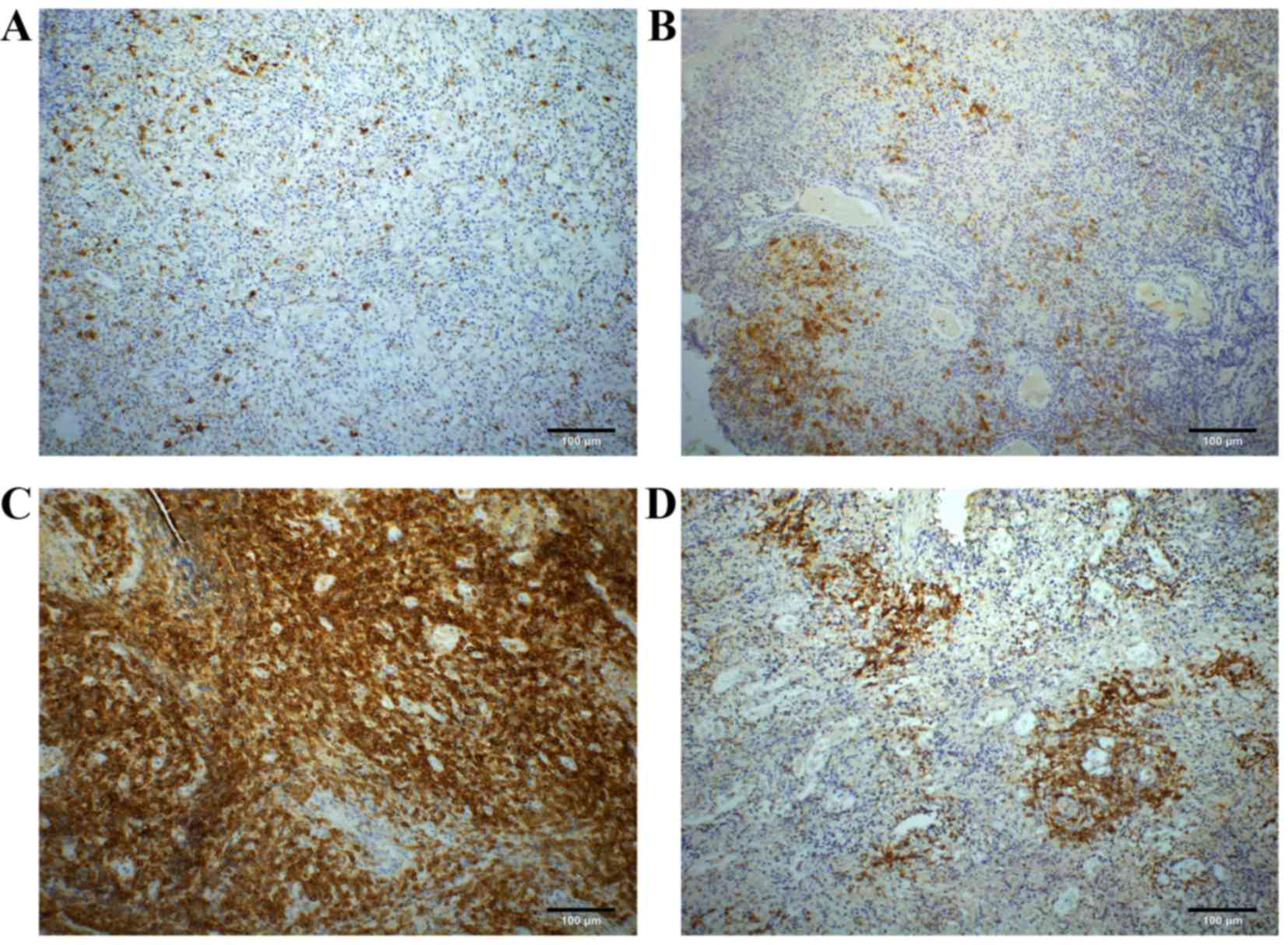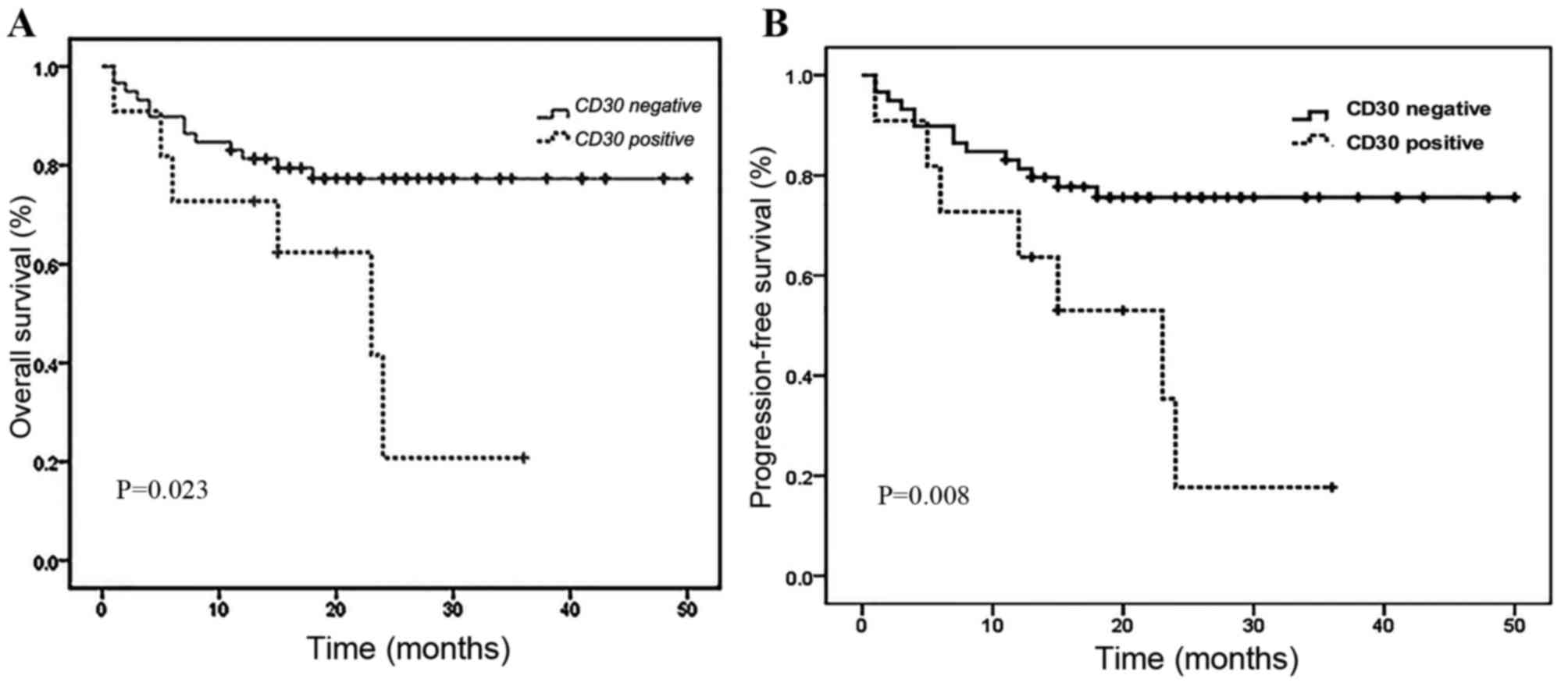|
1
|
Swerdlow SH, Campo E, Harris N, Jaffe ES,
Pileri SA, Stein H, Thiele J and Vardiman JW: World Health
Organization classification of tumors of hematopoietic and lymphoid
tissues. 4th. IARC; Lyon, France: 2008
|
|
2
|
Li XQ, Li GD, Gao ZF, Zhou XG and Zhu XZ:
The Chinese Lymphoma Study Group: Distribution pattern of lymphoma
subtypes in China: A nationwide multicenter study of 10,002 cases.
J Diagn Concepts Pract. 11:111–115. 2012.
|
|
3
|
Au WY, Weisenburger DD, Intragumtornchai
T, Nakamura S, Kim WS, Sng I, Vose J, Armitage JO and Liang R:
Clinical differences between nasal and extranasal natural
killer⁄T-cell lymphoma: A study of 136 cases from the International
Peripheral T-Cell Lymphoma Project. Blood. 113:3931–3937. 2009.
View Article : Google Scholar : PubMed/NCBI
|
|
4
|
Kim TM and Heo DS: Extranodal NK/T-cell
lymphoma, nasal type: New staging system and treatment strategies.
Cancer Sci. 100:2242–2248. 2009. View Article : Google Scholar : PubMed/NCBI
|
|
5
|
Oshimi K, Kawa K, Nakamura S, Suzuki R,
Suzumiya J, Yamaguchi M, Kameoka J, Tagawa S, Imamura N, Ohshima K,
et al: NK-cell neoplasms in Japan. Hematology. 10:237–245. 2005.
View Article : Google Scholar : PubMed/NCBI
|
|
6
|
Ye Z, Cao Q, Niu G, Liang Y, Liu Y, Jiang
L, Yu X and Han A: p63 and p53 expression in extranodal NK/T cell
lymphoma, nasal type. J Clin Pathol. 66:676–680. 2013. View Article : Google Scholar : PubMed/NCBI
|
|
7
|
Wang H, Wang L, Liu WJ, Xia ZJ, Huang HQ,
Jiang WQ, Li ZM and Lu Y: High post-treatment serum levels of
soluble programmed cell death ligand 1 predict early relapse and
poor prognosis in extranodal NK/T cell lymphoma patients.
Oncotarget. 7:3035–3345. 2016.
|
|
8
|
Wang H, Li P, Zhang X, Xia Z, Lu Y and
Huang H: Histological vascular invasion is a novel prognostic
indicator in extranodal natural killer/T-cell lymphoma, nasal type.
Oncol Lett. 12:825–836. 2016.PubMed/NCBI
|
|
9
|
Chiarle R, Podda A, Prolla G, Gong J,
Thorbecke GJ and Inghirami G: CD30 in normal and neoplastic cells.
Clin Immunol. 90:157–164. 1999. View Article : Google Scholar : PubMed/NCBI
|
|
10
|
Deutsch YE, Tadmor T, Podack ER and
Rosenblatt JD: CD30: An important new target in hematologic
malignancies. Leuk Lymphoma. 52:1641–1654. 2011. View Article : Google Scholar : PubMed/NCBI
|
|
11
|
Sabattini E, Pizzi M, Tabanelli V, Baldin
P, Sacchetti CS, Agostinelli C, Zinzani PL and Pileri SA: CD30
expression in peripheral T-cell lymphomas. Haematologica.
98:e81–e82. 2013. View Article : Google Scholar : PubMed/NCBI
|
|
12
|
Bossard C, Dobay MP, Parrens M, Lamant L,
Missiaglia E, Haioun C, Martin A, Fabiani B, Delarue R, Tournilhac
O, et al: Immunohistochemistry as a valuable tool to assess CD30
expression in peripheral T-cell lymphomas: High correlation with
mRNA levels. Blood. 124:2983–2986. 2014. View Article : Google Scholar : PubMed/NCBI
|
|
13
|
Nicolae A, Pittaluga S, Venkataraman G,
Vijnovich-Baron A, Xi L, Raffeld M and Jaffe ES: Peripheral T-cell
lymphomas of follicular T-helper cell derivation with
Hodgkin/Reed-Sternberg cells of B-cell lineage: Both EBV-positive
and EBV-negative variants exist. Am J Surg Pathol. 37:816–826.
2013. View Article : Google Scholar : PubMed/NCBI
|
|
14
|
Duvic M: CD30+ neoplasms of the skin. Curr
Hematol Malig Rep. 6:245–250. 2011. View Article : Google Scholar : PubMed/NCBI
|
|
15
|
Gaal K, Sun NC, Hernandez AM and Arber DA:
Sinonasal NK/T-cell lymphomas in the United States. Am J Surg
Pathol. 24:1511–1517. 2000. View Article : Google Scholar : PubMed/NCBI
|
|
16
|
Kuo TT, Shih LY and Tsang NM: Nasal NK/T
cell lymphoma in Taiwan: A clinicopathologic study of 22 cases,
with analysis of histologic subtypes, Epstein-Barr virus LMP-1 gene
association, and treatment modalities. Int J Surg Pathol.
12:375–387. 2004. View Article : Google Scholar : PubMed/NCBI
|
|
17
|
Li P, Jiang L, Zhang X, Liu J and Wang H:
CD30 expression is a novel prognostic indicator in extranodal
natural killer/T-cell lymphoma, nasal type. BMC Cancer. 14:8902014.
View Article : Google Scholar : PubMed/NCBI
|
|
18
|
Kim WY, Nam SJ, Kim S, Kim TM, Heo DS, Kim
CW and Jeon YK: Prognostic implications of CD30 expression in
extranodal natural killer/T-cell lymphoma according to treatment
modalities. Leuk Lymphoma. 56:1778–1786. 2015. View Article : Google Scholar : PubMed/NCBI
|
|
19
|
Hong J, Park S, Baek HL, Jung JH, Kang IG,
Sym SJ, Park J, Ahn JY, Cho EK, Kim ST, et al: Tumor cell nuclear
diameter and CD30 expression as potential prognostic parameter in
patients with extranodal NK/T-cell lymphoma, nasal type. Int J Clin
Exp Pathol. 5:939–947. 2012.PubMed/NCBI
|
|
20
|
Li T, Zhang B, Ye Y and Yin H:
Immunohistochemical and genetic analysis of Chinese nasal natural
killer/T-cell lymphomas. Hum Pathol. 37:54–60. 2006. View Article : Google Scholar : PubMed/NCBI
|
|
21
|
Schwartz EJ, Molina-Kirsch H, Zhao S,
Marinelli RJ, Warnke RA and Natkunam Y: Immunohistochemical
characterization of nasal-type extranodal NK/T-cell lymphoma using
a tissue microarray: An analysis of 84 cases. Am J Clin Pathol.
130:343–351. 2008. View Article : Google Scholar : PubMed/NCBI
|
|
22
|
Ko YH, Ree HJ, Kim WS, Choi WH, Moon WS
and Kim SW: Clinicopathologic and genotypic study of extranodal
nasal-type natural killer/T-cell lymphoma and natural killer
precursor lymphoma among Koreans. Cancer. 89:2106–2116. 2000.
View Article : Google Scholar : PubMed/NCBI
|
|
23
|
Lu D, Lin CN, Chuang SS, Hwang WS and
Huang WT: T-cell and NK/T-cell lymphomas in southern Taiwan: A
study of 72 cases in a single institute. Leuk Lymphoma. 45:923–928.
2004. View Article : Google Scholar : PubMed/NCBI
|
|
24
|
Ramos-Vara JA and Miller MA: Comparison of
two polymer-based immunohistochemical detection systems: ENVISION+
and ImmPRESS. J Microsc. 224:135–139. 2006. View Article : Google Scholar : PubMed/NCBI
|
|
25
|
Oshimi K: Progress in understanding and
managing natural killer-cell malignancies. Br J Haematol.
139:532–544. 2007. View Article : Google Scholar : PubMed/NCBI
|
|
26
|
Mraz-Gernhard S, Natkunam Y, Hoppe RT,
LeBoit P, Kohler S and Kim YH: Natural killer/natural killer-like
T-cell lymphoma, CD56, presenting in the skin: An increasingly
recognized entity with an aggressive course. J Clin Oncol.
19:2179–2188. 2001.PubMed/NCBI
|
|
27
|
Hu S, Xu-Monette ZY, Balasubramanyam A,
Manyam GC, Visco C, Tzankov A, Liu WM, Miranda RN, Zhang L,
Montes-Moreno S, et al: CD30 expression defines a novel subgroup of
diffuse large B-cell lymphoma with favorable prognosis and distinct
gene expression signature: A report from the International DLBCL
Rituximab-CHOP Consortium Program Study. Blood. 121:2715–2724.
2013. View Article : Google Scholar : PubMed/NCBI
|
|
28
|
Bisig B, de Reyniès A, Bonnet C, Sujobert
P, Rickman DS, Marafioti T, Delsol G, Lamant L, Gaulard P and de
Leval L: CD30-positive peripheral T-cell lymphomas share molecular
and phenotypic features. Haematologica. 98:1250–1258. 2013.
View Article : Google Scholar : PubMed/NCBI
|
















